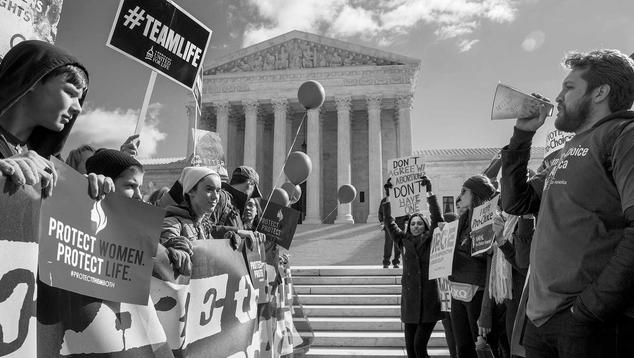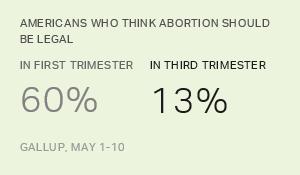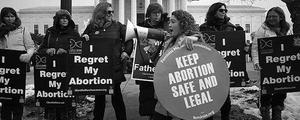Story Highlights
- Americans lean against fetal heartbeat laws and overturning Roe v. Wade
- Record high 29% will only consider like-minded candidates on abortion
- Public still closely divided in identifying as "pro-life" or "pro-choice"
WASHINGTON, D.C. -- As activists on both sides of the abortion debate respond to a spate of new state laws aimed at curtailing first-term abortions, Gallup finds the views of U.S. adults about abortion holding steady. At the same time, more Americans than ever before in Gallup polling say their support for candidates will hinge on the issue.
Currently, 53% of U.S. adults believe abortion should be legal "only under certain circumstances," far more than the 25% who favor it being legal with no restrictions and the 21% who think it should be completely illegal. These results from a May 1-12 Gallup poll, align with what Gallup has found most years since 1975, the year it began tracking these attitudes.
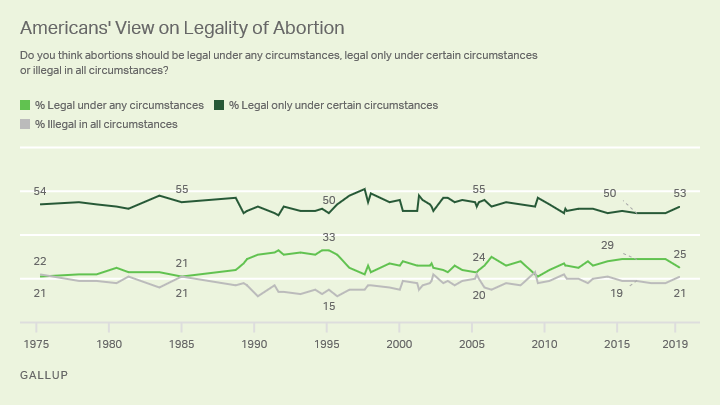
A follow-up question asks those who favor abortion being legal in certain circumstances whether it should be legal in "most circumstances" or "only in a few circumstances." As Gallup has found consistently over the years, most of this middle group opts for the most restrictive position, resulting in 13% of all adults wanting abortion to be legal under most circumstances and 39% in only a few circumstances.
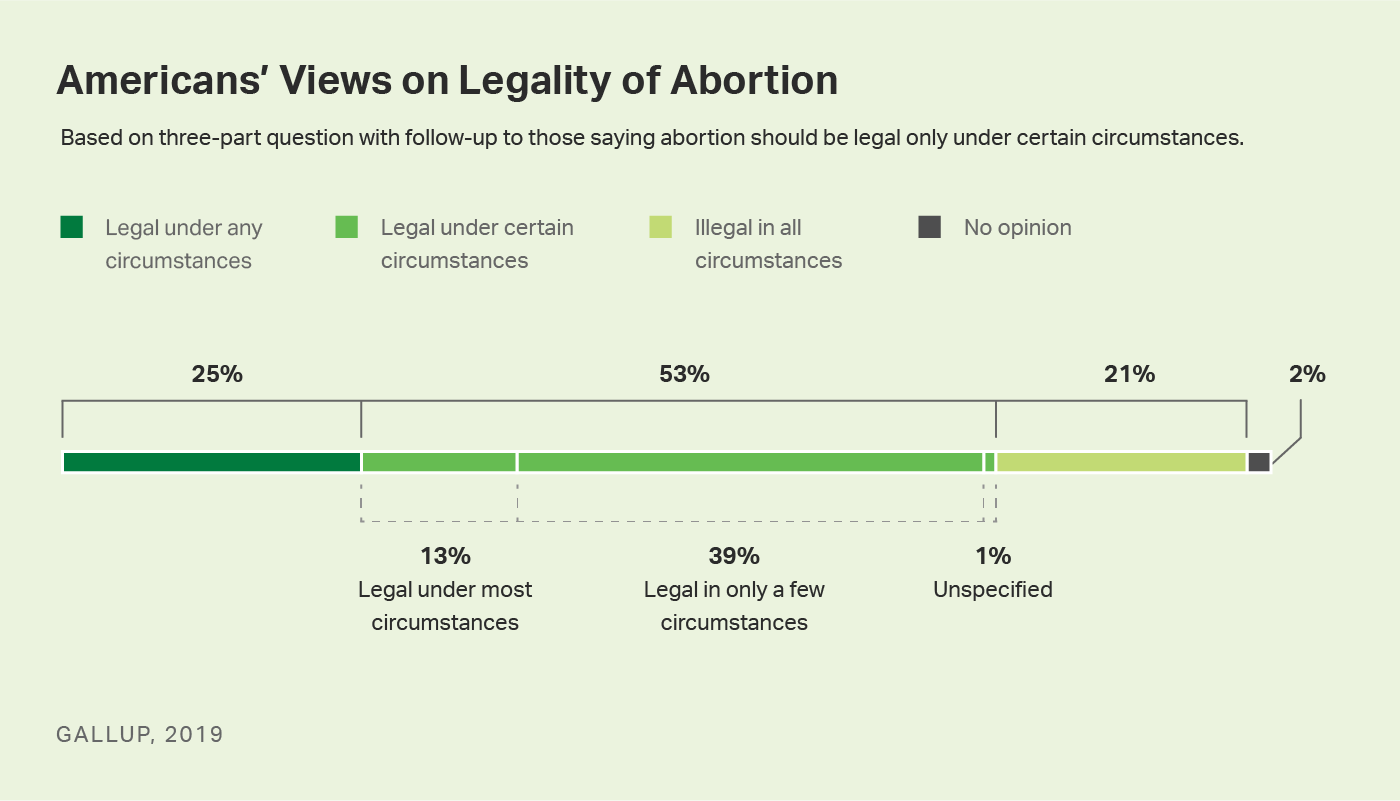
Majority Opposed to Fetal Heartbeat Laws
"Heartbeat laws," which have been enacted in six states thus far in 2019, along with even more restrictive policies in three others, are putting abortion back in the forefront of national discussion and encouraging both sides to gear up for an anticipated legal battle at the Supreme Court.
Even as 60% of Americans say abortion should either not be legal at all or only legal in a few circumstances, a majority don't support laws that would outlaw abortion once a fetal heartbeat can be detected. This was defined in the question as occurring "usually around the sixth week of pregnancy."
Fifty-eight percent of Americans say they would oppose a ban on abortions after a fetal heartbeat can be detected while 40% are in favor. Notably, this conforms with Americans' views on first trimester abortions more generally. According to a May 2018 Gallup survey, 60% think abortion should generally be legal in the first three months of pregnancy while most oppose it in the later months.
There are relatively minor differences in views toward heartbeat laws by gender and age, but a more sizeable difference by region of the country. Those in the South, where most of the laws have been enacted, show the highest support (47% in favor) while those in the East (26%) show the least.
| Favor | Oppose | No opinion | ||||||||||||||||||||||||||||||||||||||||||||||||||||||||||||||||||||||||||||||||||||||||||||||||||
|---|---|---|---|---|---|---|---|---|---|---|---|---|---|---|---|---|---|---|---|---|---|---|---|---|---|---|---|---|---|---|---|---|---|---|---|---|---|---|---|---|---|---|---|---|---|---|---|---|---|---|---|---|---|---|---|---|---|---|---|---|---|---|---|---|---|---|---|---|---|---|---|---|---|---|---|---|---|---|---|---|---|---|---|---|---|---|---|---|---|---|---|---|---|---|---|---|---|---|---|---|
| % | % | % | ||||||||||||||||||||||||||||||||||||||||||||||||||||||||||||||||||||||||||||||||||||||||||||||||||
| U.S. adults | 40 | 58 | 3 | |||||||||||||||||||||||||||||||||||||||||||||||||||||||||||||||||||||||||||||||||||||||||||||||||
| Region | ||||||||||||||||||||||||||||||||||||||||||||||||||||||||||||||||||||||||||||||||||||||||||||||||||||
| East | 26 | 70 | 3 | |||||||||||||||||||||||||||||||||||||||||||||||||||||||||||||||||||||||||||||||||||||||||||||||||
| Midwest | 39 | 58 | 3 | |||||||||||||||||||||||||||||||||||||||||||||||||||||||||||||||||||||||||||||||||||||||||||||||||
| South | 47 | 51 | 2 | |||||||||||||||||||||||||||||||||||||||||||||||||||||||||||||||||||||||||||||||||||||||||||||||||
| West | 41 | 56 | 3 | |||||||||||||||||||||||||||||||||||||||||||||||||||||||||||||||||||||||||||||||||||||||||||||||||
| Gallup, June 3-16, 2019 | ||||||||||||||||||||||||||||||||||||||||||||||||||||||||||||||||||||||||||||||||||||||||||||||||||||
Americans Also Reject Reversing Roe v. Wade
A similar percentage of Americans, 60%, does not want the Supreme Court to overturn Roe v. Wade, the landmark decision that defined a woman's constitutional right to abortion. This is on par with the 64% found in 2018, as well as the 58% Gallup recorded in 1989 with slightly different wording.
Just one third of Americans favor overturning Roe v. Wade, including similar proportions of men, women and all age groups. Sharper differences are seen by party identification, with most Democrats and independents opposed to reversing Roe but nearly half of Republicans in favor.
| Yes, overturn | No, not overturn | No opinion | ||||||||||||||||||||||||||||||||||||||||||||||||||||||||||||||||||||||||||||||||||||||||||||||||||
|---|---|---|---|---|---|---|---|---|---|---|---|---|---|---|---|---|---|---|---|---|---|---|---|---|---|---|---|---|---|---|---|---|---|---|---|---|---|---|---|---|---|---|---|---|---|---|---|---|---|---|---|---|---|---|---|---|---|---|---|---|---|---|---|---|---|---|---|---|---|---|---|---|---|---|---|---|---|---|---|---|---|---|---|---|---|---|---|---|---|---|---|---|---|---|---|---|---|---|---|---|
| % | % | % | ||||||||||||||||||||||||||||||||||||||||||||||||||||||||||||||||||||||||||||||||||||||||||||||||||
| U.S. adults | 33 | 60 | 7 | |||||||||||||||||||||||||||||||||||||||||||||||||||||||||||||||||||||||||||||||||||||||||||||||||
| Gender | ||||||||||||||||||||||||||||||||||||||||||||||||||||||||||||||||||||||||||||||||||||||||||||||||||||
| Men | 32 | 59 | 9 | |||||||||||||||||||||||||||||||||||||||||||||||||||||||||||||||||||||||||||||||||||||||||||||||||
| Women | 34 | 62 | 4 | |||||||||||||||||||||||||||||||||||||||||||||||||||||||||||||||||||||||||||||||||||||||||||||||||
| Age | ||||||||||||||||||||||||||||||||||||||||||||||||||||||||||||||||||||||||||||||||||||||||||||||||||||
| 18 to 34 | 37 | 55 | 8 | |||||||||||||||||||||||||||||||||||||||||||||||||||||||||||||||||||||||||||||||||||||||||||||||||
| 35 to 54 | 31 | 62 | 8 | |||||||||||||||||||||||||||||||||||||||||||||||||||||||||||||||||||||||||||||||||||||||||||||||||
| 65 and older | 31 | 64 | 5 | |||||||||||||||||||||||||||||||||||||||||||||||||||||||||||||||||||||||||||||||||||||||||||||||||
| Party ID | ||||||||||||||||||||||||||||||||||||||||||||||||||||||||||||||||||||||||||||||||||||||||||||||||||||
| Republicans | 49 | 44 | 7 | |||||||||||||||||||||||||||||||||||||||||||||||||||||||||||||||||||||||||||||||||||||||||||||||||
| Independents | 32 | 60 | 8 | |||||||||||||||||||||||||||||||||||||||||||||||||||||||||||||||||||||||||||||||||||||||||||||||||
| Democrats | 18 | 78 | 5 | |||||||||||||||||||||||||||||||||||||||||||||||||||||||||||||||||||||||||||||||||||||||||||||||||
| Gallup, June 3-16, 2019 | ||||||||||||||||||||||||||||||||||||||||||||||||||||||||||||||||||||||||||||||||||||||||||||||||||||
Nearly Three in 10 Want Candidate Agreement on Abortion
Consistent with all prior Gallup trends on the subject, most Americans say that abortion is not critical to their vote, but the percentage saying they would only vote for a candidate for major office who shares their views on abortion has been inching up over the past decade. The figure is now 29%, compared with 20% when Gallup last asked this in 2016, and a low of 13% in 2008.
Meanwhile, the percentages saying a candidate's position on abortion is just one of many important issues they take into account when voting, or that abortion is not important to their vote, have been trending down -- currently at 44% and 26%, respectively.
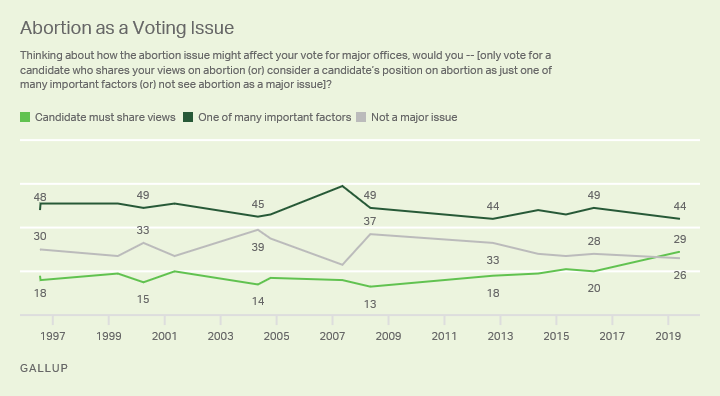
Not only is the overall percentage of Americans saying that abortion is key to their vote at a record high, but the percentage is at its peak among self-identified "pro-choice" and "pro-life" Americans.
Currently, 26% of pro-choice adults say they will only vote for a candidate who shares their views on abortion, up from 17% in 2016.
However, the matter continues to be more important as a voting issue to pro-life than pro-choice adults, as it has in every Gallup measure since 2004. Thirty-five percent of pro-life adults now say they will only vote for like-minded candidates on the issue, an increase from 23% in 2016.
Pro-Life/Pro-Choice Division Remains Steady
Despite Americans' aversion to strong anti-abortion legislation, they remain closely split in their self-identification as "pro-life" or "pro-choice" on the abortion issue. This has been the case throughout much of Gallup's measurement of the question as part of its annual Values and Beliefs survey, from 2001 on, as well as in several comparable measures between 1997 and 2000. Gallup polls in 1995 and 1996, conducted prior to congressional focus on partial-birth abortion that may have affected the debate, found a more decisive advantage for the pro-choice side.
The division between Americans identifying as pro-life and pro-choice has been particularly close in recent years. Since 2007, the percentages identifying as pro-choice and pro-life have each averaged 47% and the figures have varied by no more than five points in either direction.
The current breakdown of 49% identifying as pro-life and 46% as pro-choice falls within this range.
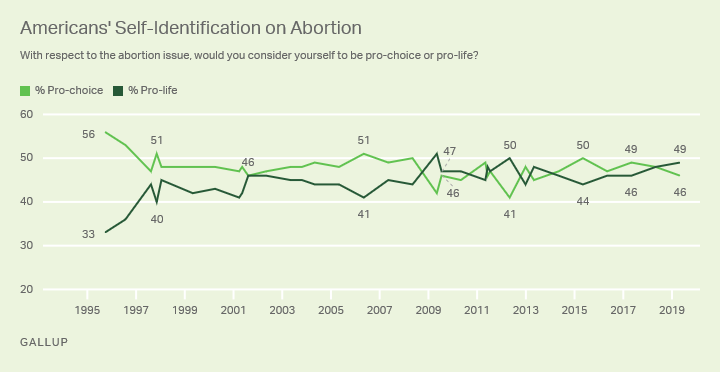
It should be noted that Americans' identification as pro-choice or pro-life can vary due to survey context. The Values and Beliefs poll poses the question after asking its long-term trend questions about the legality of abortion. This typically results in less of an advantage for the pro-choice position than when the labeling question does not follow any other abortion questions.
In its June 3-16 survey, Gallup asked the pro-choice/pro-life item without any preceding questions on abortion and found 52% identifying as pro-choice and 43% as pro-life. This is similar to the findings when the question has been asked this way since 2001, with an average 51% identifying as pro-choice and 42% as pro-life.
Bottom Line
Little has changed over the past year, or even over the past 10 years, in Americans' basic outlook on abortion. Americans' hold a nuanced view about the issue, with most believing abortion should be legal, but with some restrictions.
As prior Gallup research has shown, the two major parties have grown more polarized on the issue, with a larger proportion of Democrats identifying as pro-choice and more Republicans identifying as pro-life. But the overall size of these two policy camps has been holding steady.
What's changing, perhaps because of the recent flare of debate over state laws curtailing abortion rights in the first trimester, is that more Americans in both abortion camps are inclined to make abortion a litmus test for their vote.
View complete question responses and trends.
Learn more about how the Gallup Poll Social Series works.
